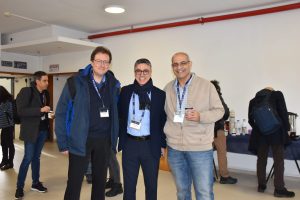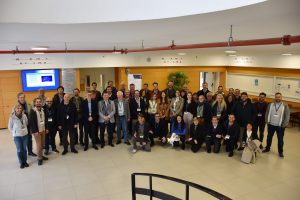LUCIA (Horizon Europe) Project Kickoff
Paving the way for better management of lung cancer
At the beginning of February, the Technion hosted the kickoff meeting for LUCIA, an international project and consortium supported by the Horizon Europe Program and headed by coordinator Prof. Hossam Haick of the Wolfson Faculty of Chemical Engineering. The two-day event was attended by sixty experts from Israel and several EU countries.
The consortium’s goal is to improve the early detection and management of lung cancer by in depth study of risk factors from exposure to individual biology, in order to improve prevention strategies, provide policy recommendations, help implement screening programs, improve diagnosis and enable precision medicine approaches.
Every thirty seconds, someone, somewhere in the world, dies of lung cancer, making this disease the deadliest in terms of the number of lives it claims. The average 5-year survival rate is presently 17% for men and 24% for women. Although smoking is considered a significant risk factor for this disease, lung cancer often also occurs among nonsmokers. Accordingly, the consortium will work on identifying all risk factors and on developing new methods for the diagnosis, prevention, and treatment of the disease.
“The LUCIA Project is being launched at the right time, with the right partners,” said Prof. Haick at the opening of the conference. Indeed, the project starts when recent early detection and screening recommendations have been proposed in the EU, Israel and other countries. “We are fortunate to have many skilled, outstanding partners from a variety of fields, and we will be working together for the next four years, applying a multidisciplinary approach, to further the understanding of the disease and develop methods to prevent, diagnose and treat it more effectively. Our work will not focus exclusively on the medical aspects of lung cancer; rather, we will be assisted by experts on law and ethics and by decision makers to put our findings into effect for the benefit of society as a whole.”
The establishment of the consortium, headed by the Technion, was funded by the EU’s research and innovation program, Horizon Europe, which supports international collaborations expected to deliver practical technological solutions to modern-day challenges, and was awarded 14.6 million euros. LUCIA is part of the new Mission of Cancer within Horizon Europe, a key research and innovation instrument within Europe’s Beating Cancer Plan to understand the complexity of cancer through multidisciplinary collaboration in disciplines such as medicine, bioengineering, biology or computer science together with key legal, ethical and social aspects. LUCIA is part of two Clusters within the EU Cancer program, ‘Understanding’ and ‘Prevention’.
LUCIA Consortium has 22 members – academic institutions and other entities – all working together to map risk factors for lung cancer while focusing on three aspects: individual risk factors, including lifestyle and exposure to pollutants; external factors, including urban or built-up areas, traffic, climate and socio-economic aspects; and biological reactions, including aging and genetic, epigenetic and metabolic changes. To this end, LUCIA’s experts are working on gaining an understanding of the molecular mechanism of the disease, the identification and analysis of relevant data repositories, and other areas.

R-L: Prof. Yuval Shaked and Prof. Hossam Haick of the Technion with Prof. Jonathan Sleeman of the University of Heidelberg
The Technion’s Executive Vice President for Research, Prof. Jacob (Koby) Rubinstein, commented: “Today, we understand that basic research isn’t enough; academia must keep in close touch with the field – industry, hospitals, and all other relevant bodies. When this relationship isn’t there, implementing basic research conducted in the academic world for the
good of mankind is very difficult. I say this from personal experience – it took 12 years for my development in optics to become a reality. Today, the Technion works based on a clear strategy that calls for bridging the gap between academia and industry, and the rewards are already evident – the Technion is the leading university in Israel in terms of the number of startups it has engendered. Your consortium well reflects this spirit, so I ask you – don’t stop until your research is implemented, meaning – until you have translated your findings into products and methods that will save the lives of lung cancer patients.”
As mentioned, the consortium is headed by coordinator Prof. Haick and the members of his research group: Dr. Yoav Broza (project manager), Liat Tzuri (administrative manager), and laboratory manager, Walaa Saliba. Prof. Yuval Shaked of the Ruth and Bruce Rappaport Faculty of Medicine is a partner in the consortium and is researching the mechanisms of lung cancer to support early diagnosis.



